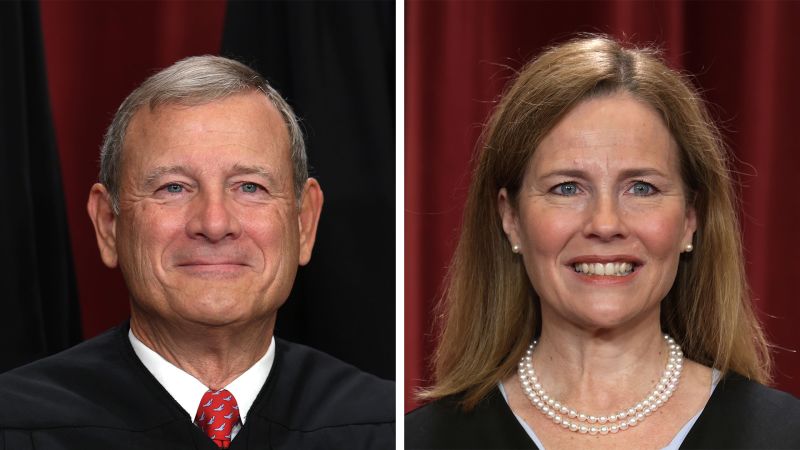John Roberts And The Supreme Court: Examining The Chief Justice's Influence

Welcome to your ultimate source for breaking news, trending updates, and in-depth stories from around the world. Whether it's politics, technology, entertainment, sports, or lifestyle, we bring you real-time updates that keep you informed and ahead of the curve.
Our team works tirelessly to ensure you never miss a moment. From the latest developments in global events to the most talked-about topics on social media, our news platform is designed to deliver accurate and timely information, all in one place.
Stay in the know and join thousands of readers who trust us for reliable, up-to-date content. Explore our expertly curated articles and dive deeper into the stories that matter to you. Visit Best Website now and be part of the conversation. Don't miss out on the headlines that shape our world!
Table of Contents
John Roberts and the Supreme Court: Examining the Chief Justice's Influence
John Roberts, the 17th Chief Justice of the United States, has profoundly shaped the Supreme Court's trajectory since his appointment in 2005. His tenure has been marked by significant ideological shifts, controversial decisions, and a persistent effort to maintain the Court's perceived legitimacy amidst increasing political polarization. Understanding his influence requires examining both his judicial philosophy and his strategic maneuvering within the Court's dynamics.
A Conservative Legacy, a Pragmatic Approach?
Chief Justice Roberts is often described as a conservative jurist, a label supported by his rulings on issues like campaign finance, affirmative action, and abortion rights. Cases like Citizens United v. FEC (2010), which significantly loosened campaign finance restrictions, and Shelby County v. Holder (2013), which gutted a key provision of the Voting Rights Act, solidify this perception. However, analysts also point to instances where Roberts has demonstrated a more pragmatic, even moderate, approach, defying strict ideological categorization. His pivotal vote upholding the Affordable Care Act in National Federation of Independent Business v. Sebelius (2012) is a prime example, surprising many legal observers.
This apparent inconsistency has fueled ongoing debate among legal scholars. Some argue that Roberts prioritizes preserving the Court's institutional integrity over strict adherence to a particular ideology. Others contend that his decisions are driven by a more nuanced understanding of constitutional principles, incorporating considerations beyond simple conservative or liberal frameworks.
Navigating the Court's Ideological Divide
The Supreme Court under Roberts' leadership has become increasingly polarized, reflecting the broader political divisions in the United States. The appointment of conservative justices like Neil Gorsuch, Brett Kavanaugh, and Amy Coney Barrett has shifted the Court's ideological balance significantly. Roberts, as Chief Justice, plays a crucial role in managing this dynamic, assigning opinions and influencing the Court's overall agenda.
His influence is not just about the outcome of individual cases but also about shaping the Court's public perception. He has often sought to present a unified front, even when dissenting opinions highlight deep disagreements. This strategy aims to maintain the Court’s authority and prevent it from being seen as purely partisan.
The Chief Justice's Role Beyond Case Decisions
Roberts' influence extends beyond the specific rulings. His administrative role as Chief Justice involves managing the Court's internal operations, including its docket, its rules, and its public image. He is responsible for the Court's overall efficiency and its communication with the public and other branches of government. His decisions regarding which cases to hear and the manner in which they are presented significantly impact the Court's overall influence on American society.
The Future of the Supreme Court Under Roberts' Leadership
With several years potentially remaining in his tenure, Chief Justice Roberts' influence on the Supreme Court continues to be a subject of intense scrutiny and analysis. His strategic decisions, his ability to navigate the Court's ideological divisions, and his approach to managing the Court's public image will continue to shape the future of American jurisprudence for years to come. The question remains: will his pragmatic approach prevail, or will the increasingly conservative leanings of the Court dominate his legacy? Only time will tell.
Keywords: John Roberts, Supreme Court, Chief Justice, SCOTUS, conservative, liberal, judicial philosophy, jurisprudence, constitutional law, Citizens United, Affordable Care Act, Court politics, legal analysis, American politics.

Thank you for visiting our website, your trusted source for the latest updates and in-depth coverage on John Roberts And The Supreme Court: Examining The Chief Justice's Influence. We're committed to keeping you informed with timely and accurate information to meet your curiosity and needs.
If you have any questions, suggestions, or feedback, we'd love to hear from you. Your insights are valuable to us and help us improve to serve you better. Feel free to reach out through our contact page.
Don't forget to bookmark our website and check back regularly for the latest headlines and trending topics. See you next time, and thank you for being part of our growing community!
Featured Posts
-
 John Robertss Power How The Chief Justice Shapes Supreme Court Outcomes
Jul 05, 2025
John Robertss Power How The Chief Justice Shapes Supreme Court Outcomes
Jul 05, 2025 -
 After Labour Exit Zarah Sultana And Jeremy Corbyns Next Move
Jul 05, 2025
After Labour Exit Zarah Sultana And Jeremy Corbyns Next Move
Jul 05, 2025 -
 Australia Vs Panama Live International Womens Football Friendly Match
Jul 05, 2025
Australia Vs Panama Live International Womens Football Friendly Match
Jul 05, 2025 -
 Oasis Return A Look At The Sound And Success Of The Tour
Jul 05, 2025
Oasis Return A Look At The Sound And Success Of The Tour
Jul 05, 2025 -
 Post Trump Putin Call Russia Unleashes Unprecedented Drone Barrage On Ukraine
Jul 05, 2025
Post Trump Putin Call Russia Unleashes Unprecedented Drone Barrage On Ukraine
Jul 05, 2025
Latest Posts
-
 Tim Burton Teases New Movie Details And Release Date Speculation
Jul 05, 2025
Tim Burton Teases New Movie Details And Release Date Speculation
Jul 05, 2025 -
 New Zealand All Blacks Vs France Where To Watch The Rugby Match Live
Jul 05, 2025
New Zealand All Blacks Vs France Where To Watch The Rugby Match Live
Jul 05, 2025 -
 Police Investigating Off Duty Incident Involving Apd Officer
Jul 05, 2025
Police Investigating Off Duty Incident Involving Apd Officer
Jul 05, 2025 -
 After Labour Exit Zarah Sultana And Jeremy Corbyns Next Move
Jul 05, 2025
After Labour Exit Zarah Sultana And Jeremy Corbyns Next Move
Jul 05, 2025 -
 Catholic Leader Condemns Trumps Immigration Deportations As Morally Repugnant
Jul 05, 2025
Catholic Leader Condemns Trumps Immigration Deportations As Morally Repugnant
Jul 05, 2025
